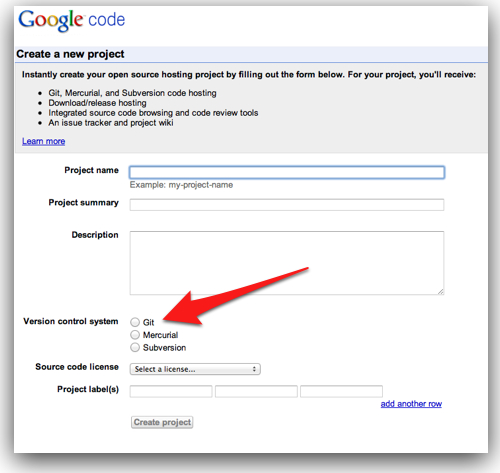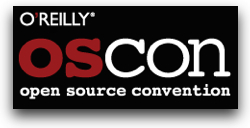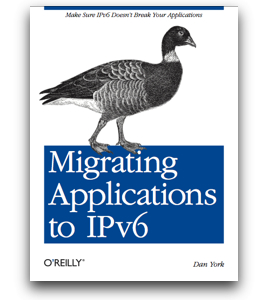Just a guy in Vermont trying to connect all the dots...
Author's posts
Aug 02
Dulwich – a native python way to access Git repositories
 Ever wanted to manipulate Git repositories directly in python? Well, okay… I haven’t really myself, but in writing about Google Code’s support for git yesterday, I noticed that they are using Dulwich, a native python implementation of git. Rather than wrapping command-line git with python scripts, Dulwich is a python module giving you direct access to a git repository. As shown in the Dulwich tutorial, creating a new repo is simply this:
Ever wanted to manipulate Git repositories directly in python? Well, okay… I haven’t really myself, but in writing about Google Code’s support for git yesterday, I noticed that they are using Dulwich, a native python implementation of git. Rather than wrapping command-line git with python scripts, Dulwich is a python module giving you direct access to a git repository. As shown in the Dulwich tutorial, creating a new repo is simply this:
>>> from dulwich.repo import Repo
>>> from os import mkdir
>>> mkdir("myrepo")
>>> repo = Repo.init("myrepo")
>>> repo
<Repo at 'myrepo'>
Once a repo is created (or you connect to an existing repo), you can do what you would do with git at the command line: adding files to the repo, committing files, and changing files.
While I don’t know that I personally will use this… it’s very cool that Dulwich is out there for python programmers who want to interact with git repos. Very cool to see!
Aug 01
European Union Security Agency Releases Report Analyzing HTML5 Security
While not directly related to Unified Communications, the reality is that many UC web interfaces, particularly for mobile devices, may turn to HTML5 as a way to create a web interface that provides an excellent user interface and works across all mobile devices.
Perhaps more importantly, the work of the RTCWEB/WebRTC working groups within the IETF and W3C, which I've written about over on Voxeo's blogs, is aimed at bringing the "real-time communications" functionality directly into the web browser. In other words, you wouldn't need a browser plugin or additional program on your computer to make voice, video or chat connections… it could happen entirely within the browser.
At that point every browser potentially can become a UC endpoint… and therefore a concern for communications security.
It's a lengthy document from ENISA, but worth a read as it dives into both analysis and recommendations for greater HTML5 security.
Aug 01
Google Code Now Supports Git for Hosted Projects
Being a big fan of Git for version control, I was very pleased to see the announcement last week that projects hosted at Google Code can now use git in addition to subversion and mercurial (see also Google Code’s GitFAQ). I had looked at hosting projects on Google Code in the past, but chose not to specifically because git was not an option. While I personally am quite happy using Github for project hosting, it’s always good to see other services supporting git:

Way to go, Google Code!
Aug 01
XKCD’s Brilliant – And Sad – Comic About Cancer…
The scary part is exactly what the strip shows... you don't know if or when it may ever return. :-(
And yeah... F___ Cancer!
Aug 01
Walled Garden Deja Vu: Facebook Provides "facebook.com" Email Addresses
Over the weekend, I had a severe case of deja vu... and found myself humming that song from Styx that includes the line "Haven't we been here before...".
Why?
Because Facebook followed through on its earlier statement around letting people receive email to a "facebook.com" email address:
So yes, indeed, because clearly I need more email addresses, you can now send me email to:
dyork@facebook.com
[On a side note, I will be very curious to see what kind of anti-spam measures Facebook puts in place as these addresses get out there. Consider this my little test... putting that email address out here on a public blog site where it can be easily scraped.]
The deja vu part is that ... we've been here before. Remember AOL? CompuServer? Prodigy? Delphi? MCI Mail? GENIE?
Remember all those "walled gardens" of the original "computer information services"?
And remember those glorious days when you could FINALLY get an email address so that you could send and receive to people outside the walls of whatever service you used? (Even if those addresses were sometimes hard to write or remember? ex. CompuServe's numerical addresses.)
While I realize that some % of readers of this post in 2011 were probably not born in the heydey of those services, for those of us who were around those were big days when we finally got those email addresses.
Soon everyone had an open Internet email address... the walls came down... and communication happened across all services.
Over time, though, the walls started coming back up. I wrote about this four years ago in a May 2007 post, "Facebook, MySpace, Twitter and the Return of the Walled Gardens of E-Mail" and drew my view of the evolution of email:
[Another side note: Notice how things change in 4 years and some of the services I mentioned on the right that are no longer around or relevant...]
And so now we Facebook giving us a way to receive email messages. We've had the ability to send email messages out of Facebook for some time now, but it was sent from cryptic, ugly addresses that changed. Now we have a "regular" email address... and indeed an outbound message from Facebook to my "dyork@voxeo.com" address looks fine in my regular email client:
Note, of course, that since Facebook does not let you set a "Subject" line on an outbound message you create, the subject is simply "Conversation with Dan York".
When a message is initially received from the outside, the subject line of that email is preserved, as you can see here:
The "Hidden Text" in this case was my normal Voxeo email signature.
All in all it works quite well. I'm not naive enough to think that this is some great idea by Facebook to open up to the outside world... the simple fact is that they want to keep you inside of Facebook where you interact with people on Facebook... and, oh, yes, view all the advertising.
If Facebook can convince you to use the site as your email portal, instead of, oh, GMail, then Facebook and their advertisers win against Google and its advertisers.
Of course, Facebook still has its incredibly onerous Terms of Service that basically says all your email - and any other content - belong to Facebook... so I don't see me personally using my "dyork@facebook.com" email account all that often outside of the regular FB messaging I'll be doing there.
Still, all cynicism and deja vu aside, as an advocate for the open Internet I am pleased to see this move by Facebook. Some people have made Facebook their portal of choice... and this now lets people choose other sites as their portals of choice, yet still communicate with Facebook users.
In the end, this openness - and ability for us to control our choice of communication - is exactly what we need.
Have you "claimed" your Facebook email address yet? Will you use it?
If you found this post interesting or useful, please consider either:
- following me on Twitter;
- adding me to a circle on Google+;
- subscribing to my email newsletter; or
- subscribing to the RSS feed.
Jul 28
One Simple Reason O’Reilly ROCKS as an Ebook Publisher
Like many technical folks, I've long been a fan of O'Reilly books, having purchased my first "animal" book sometime back in the late 1980's, but as we collectively make the transition to the world of ebooks, I've discovered one simple reason O'Reilly truly rocks as a publisher:
http://oreilly.com/e/
That's it! Enter that one little URL into the browser on your tablet, mobile phone or e-reader and after you login... ta da... there are all the O'Reilly ebooks you have purchased! No need to sync to a program on your laptop or desktop ... just straight downloads to your device to open in whatever program you use - iBooks, Kindle, Stanza, whatever...
Here's how it looks on my iPad:
As you can see, books are available in whatever formats they were produced in... so you can grab ePub for iBooks or Stanza, Mobi for Kindle, or just a straight-up PDF for use in other apps. You aren't limited to one format, either, as you can download all of the formats if you want. O'Reilly has also taken the step to deliver their downloads DRM-free, so you can use them on any device.
The image on the right shows the same screen on my iPhone. The URL will naturally work on a laptop or desktop, too, but the beauty of it is that the URL is so trivial to enter into a mobile device. About as small a URL as you can get.
The great thing about ebooks is, of course, that you always get the latest version of whatever the author has uploaded. And O'Reilly routinely alerts you via email whenever there are new updates for you to download.
That one simple URL makes it so easy to obtain whatever books you purchase and whatever updates there are.
In full disclosure, I now am an "O'Reilly author" with my latest book, "Migrating Applications to IPv6", but that is just recent (last month) and I started purchasing O'Reilly ebooks quite some time ago for my iPad.
The whole world of ebooks is undergoing an amazing amount of innovation right now... and it's great to see publishers like O'Reilly trying out new ideas to see what works. And in my mind, having an easy-to-access portal to all your ebooks at a super-simple URL is a great idea!
Thanks, O'Reilly, for making it so simple to get to your ebooks!
If you found this post interesting or useful, please consider either:
- following me on Twitter;
- adding me to a circle on Google+;
- subscribing to my email newsletter; or
- subscribing to the RSS feed.
Jul 27
I am NOT Speaking at OSCON Friday About IPv6
 Sadly, I will not be speaking about migrating applications to IPv6 on this Friday, July 29, at OSCON 2011 up in Portland, Oregon. Instead, my colleague Adam Kalsey will be presenting the talk on my behalf. (Adam is also speaking about managing open source releases of a cloud platform.)
Sadly, I will not be speaking about migrating applications to IPv6 on this Friday, July 29, at OSCON 2011 up in Portland, Oregon. Instead, my colleague Adam Kalsey will be presenting the talk on my behalf. (Adam is also speaking about managing open source releases of a cloud platform.)
As I wrote in the beginning of the book, it was my proposal to OSCON (which was accepted and scheduled) that prompted O’Reilly editor Mike Loukides to contact me about writing what become the book “Migrating Applications to IPv6“.
In a cruel twist of fate, though, I am now unable to attend OSCON and give the very presentation that prompted the book. Shortly after signing the contract to write the ebook a few months ago, my wife was diagnosed with very early stage breast cancer. While she has now “survived” this bout of cancer, she is still in recovery from the operation, is still in pain and still has a limited range of motion and ability to lift objects. Most importantly, she still can’t really lift our 2-year-old daughter… and, as anyone who has had a 2-year-old can attest, they frequently need lifting! So this year my place needs to be here with her…
While I’m sure Adam will give a great session on Friday and while I may be doing a follow-up webinar with O’Reilly, I would have loved to be out at the über-geekfest that is OSCON! For those who are there, I hope you have a great conference – and perhaps I’ll see you there next year!
P.S. And I am greatly appreciative to Adam for covering my presentation!
Jul 25
Interested in Reviewing “Migrating Applications to IPv6”? Looking For Reviewers…
 Are you wondering about what might be involved with making an application work with IPv6? Do you develop apps and haven’t given much thought to IPv6, but are thinking maybe you should? Or are you an advocate for IPv6 looking to understand what books are out there?
Are you wondering about what might be involved with making an application work with IPv6? Do you develop apps and haven’t given much thought to IPv6, but are thinking maybe you should? Or are you an advocate for IPv6 looking to understand what books are out there?
If you answered yes to any of these questions, would you be interested in reviewing my latest book, “Migrating Applications to IPv6“, published by O’Reilly in June 2011?
I have two reasons for asking:
- The reality of today’s book marketplace is that reviews sell books. People do make purchasing decisions based on reading the reviews that people write. Right now there’s only 1 review of my book on O’Reilly’s site and none on Amazon.com. I’d love to see a few more out there on those sites… I’d also love to see some independent reviews on blog sites.
- The other reality is – I would like feedback! I’ve had some great comments from some friends who work with IPv6, but I’d like to get more feedback. Is the book appropriate for the target market? Is there anything more you’d like to see in the book? Were there sections that you felt could have had more text?
The beautiful thing about this book is that O’Reilly is focused on it being a living, breathing eBook. I can add more text or sections to it at any time and that new content will then be made available to anyone who has purchased the eBook. (eBook owners get email notifications through O’Reilly’s store mechanism… which works really well in my experience! You can also just login to O’Reilly’s site and see what books have new versions waiting for you to download.)
So in my mind I would like to see this book be an ongoing compilation of “best practices” around migrating applications to IPv6. I already have some ideas for additions… but I’d like to hear from others.
If you are interested in reviewing the book, please drop me an email and include in your message the email address you use at members.oreilly.com (and if you don’t have an account you can sign up for free). I will then pass your info along to O’Reilly and they will drop a copy of the eBook in your O’Reilly account. You can then download the book in the format of your choice: ePub, Mobi (Kindle) or PDF.
All I would ask is that in return you post an honest review of the book somewhere on the web… O’Reilly’s site… Amazon… your blog… some other site. Note that I’m not just asking for glowing reviews… sure, I love those and they help… but if you don’t like the book or think it has issues, I want to hear that feedback, too! At this point my main interest is in seeing some more reviews out there.
Thanks for the consideration!
Jul 25
Fascinating Chart of Growth of Google+ Relative to Facebook and Twitter
Now, of course, being the newcomer Google+ benefits from already having Facebook and Twitter out there to spread the news about Google+ ... and to spread the links to Google+ material.
Google also has the massive directory of users of Google services... from Gmail to Google Docs and everything in between.
So on one level it's no surprise to see the phenomenal growth... still, it's quite impressive by any measure.
P.S. And of course I am on Google+...
If you found this post interesting or useful, please consider either:
- following me on Twitter;
- adding me to a circle on Google+;
- subscribing to my email newsletter; or
- subscribing to the RSS feed.
Jul 20
Mac OS X Lion is now in the App Store – are you upgrading?
It’s here! Now available in the App Store…

Are you upgrading today? I’m going to wait a bit on my corporate MacBook Pro to make sure all the apps we use are compatible with Lion… but I’m thinking my home iMac is definitely getting the treatment today… 🙂
How about you?
P.S. TheNextWeb folks came out with a nice summary of what’s new in Lion.

